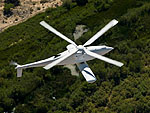Boeing A160T Unmanned Helicopter Flies With Foliage-Penetrating Radar in DARPA Tests
 IRVINE, Calif., Oct. 13, 2009 - The Boeing [NYSE: BA] A160T Hummingbird unmanned helicopter successfully completed 20 test flights from Aug. 31 to Oct. 8 with the Foliage Penetration Reconnaissance, Surveillance, Tracking and Engagement Radar (FORESTER). The tests, conducted at Fort Stewart, Ga., validated the radar-carrying A160T's flight characteristics with more than 50 hours of flying time.
IRVINE, Calif., Oct. 13, 2009 - The Boeing [NYSE: BA] A160T Hummingbird unmanned helicopter successfully completed 20 test flights from Aug. 31 to Oct. 8 with the Foliage Penetration Reconnaissance, Surveillance, Tracking and Engagement Radar (FORESTER). The tests, conducted at Fort Stewart, Ga., validated the radar-carrying A160T's flight characteristics with more than 50 hours of flying time.
FORESTER is being developed by the Defense Advanced Research Projects Agency (DARPA) and the U.S. Army to provide enhanced coverage of moving vehicles and dismounted troops under foliage, filling the current surveillance gap. The Fort Stewart tests were conducted under a contract with DARPA.
"The success of these test flights points to the operational readiness of this important capability," said Vic Sweberg, director of Unmanned Airborne Systems (UAS) for Boeing. "The FORESTER is a unique radar, and the A160T is a unique helicopter. Together, they make a formidable system."
The 53 flight hours at Fort Stewart pushed the total flight hours for the A160T past the 220-hour mark. The helicopter's longest flight at Fort Stewart was 5.8 hours and its average flight time was 4.2 hours.
The A160T is a turbine-powered unmanned helicopter that can perform numerous missions, including intelligence, surveillance and reconnaissance, communications, and precision resupply. It holds the world record for endurance for its class (more than 18 hours unrefueled), can hover at 20,000 feet and can carry up to 2,500 pounds of cargo.
The Hummingbird recently was selected to participate in the U.S. Marine Corps Warfighting Laboratory's Immediate Cargo Unmanned Aerial System Demonstration Program. Boeing will demonstrate that the A160T can deliver at least 2,500 pounds of cargo from one simulated forward-operating base to another in fewer than six hours per day for three consecutive days.
The goal of Boeing's UAS division is to provide access to a breadth of unmanned capabilities in a way that best meets customers' needs. Boeing currently offers a wide variety of unmanned aircraft systems, including the A160 Hummingbird, ScanEagle, Unmanned Little Bird and SolarEagle.